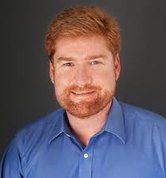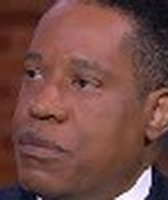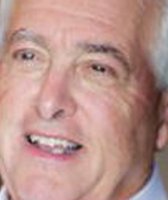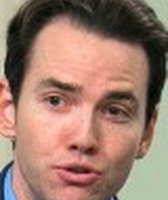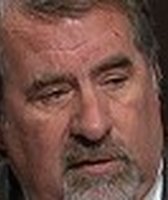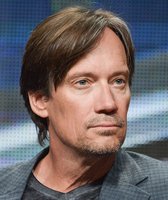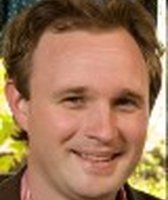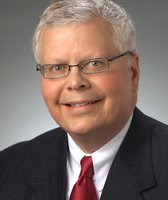Stand up for the facts!
Our only agenda is to publish the truth so you can be an informed participant in democracy.
We need your help.
I would like to contribute
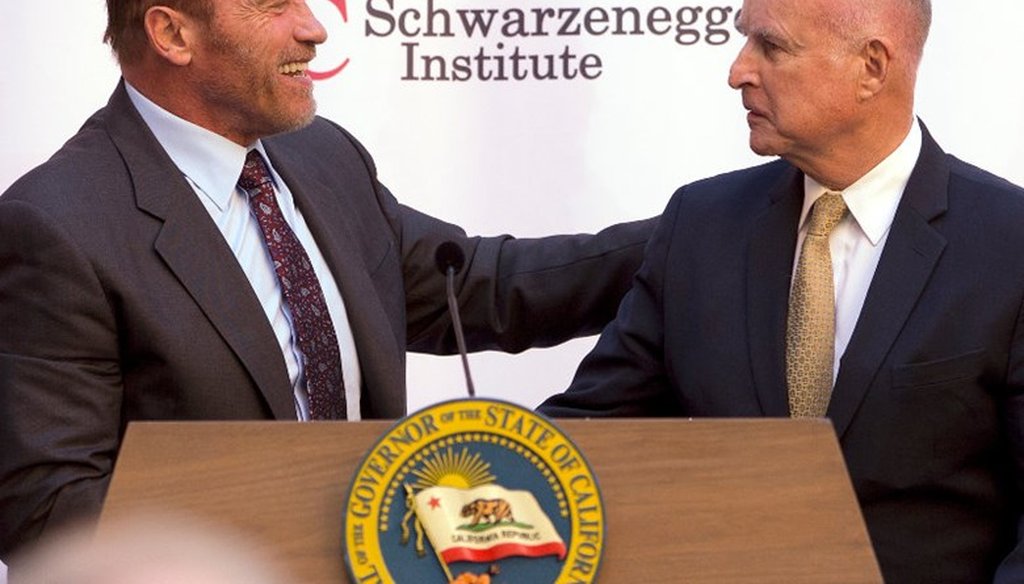
Former Gov. Arnold Schwarzenegger, left, shakes hands with Gov. Jerry Brown during a celebration of the 10th Anniversary of Schwarzenegger signing California's landmark global warming bill, AB32, Oct. 5, 2016, in Sacramento, Calif.
LISTEN TO THIS STORY:
Former Gov. Arnold Schwarzenegger wants to terminate the idea that California’s clean energy experiment has turned it into an economic wimp.
The muscle-bound movie star, who’s now a climate change activist, argues it hasn’t.
As governor, Schwarzenegger signed California’s signature clean energy regulations into law in 2006. Known as the California Global Warming Solutions Act, or AB 32, the law requires the state to dramatically cut its greenhouse gas emissions.
Sign up for PolitiFact texts
At the time, supporters claimed the clean energy push would be an economic engine for California, spurring a wave of new job growth. Opponents, meanwhile, predicted it would cripple the Golden State, spiking energy costs and forcing firms to move elsewhere.
A decade later, the debate over whether California’s clean energy rules, including AB 32 and others, have helped or hurt its economy continues unabated at the state Capitol and beyond.
Last month, Schwarzenegger, a Republican, added fuel to the debate in a Facebook post by saying: "A clean energy future is a wise investment, and anyone who tells you otherwise is either wrong, or lying. Either way, I wouldn't take their investment advice. Renewable energy is great for the economy, and you don't have to take my word for it. California has some of the most revolutionary environmental laws in the United States, we get 40% of our power from renewables, and we are 40% more energy efficient than the rest of the country. We were an early-adopter of a clean energy future. Our economy has not suffered."
Schwarzenegger isn’t the only one with forceful opinions. Dan Logue, a Republican and former state Assemblyman, told a local newspaper in 2009 that AB 32 would cost the state more than one million jobs once it was fully implemented.
"This has been the blind leading the blind, political correctness that has collapsed the economy in California," Logue said. "California already has the fifth-cleanest air in the country, so why are we doing this when no one else is?"
Too tough to rate
Evaluating the accuracy of Schwarzenegger’s statement, specifically "our economy has not suffered" due to the clean energy laws, is daunting.
We decided not to rate it on our Truth-O-Meter, because there are no comprehensive reports on the matter that are both independent and rigorous, according to the experts we spoke with. But we wanted to investigate how California's economy is performing and learn how we might evaluate the former governor’s statement once more information is available.
We also asked for a clarification from Schwarzenegger on his statement "Our economy has not suffered." His spokesman, Daniel Ketchell, told us: "This is mainly a response to all of the people who said we would lose jobs and our economy would crumble. There was a large group of naysayers that said these regulations would destroy California’s economy. All he’s saying is that people who said our economy would fail are wrong."
After looking into this, Schwarzenegger is correct about one thing: The Golden State’s economy hasn’t tanked over the past decade. California’s state gross domestic product has increased from about $1.8 trillion in 2006, the year Schwarzenegger signed AB 32 into law, to more than $2.3 trillion last year, according to state finance figures. Sorting out how much the clean energy rules contributed to or perhaps slowed that economic growth remains a mystery.
California has enjoyed an economic rebound since the Great Recession. It’s added jobs at a faster clip than most states in recent years. And its unemployment rate has tumbled from double digits in 2010 and 2011 to 5.7 percent last month.
Economists attribute the comeback to the state’s rejuvenated housing and construction sectors and its booming tech industry.
Studies "not convincing"
There are numerous industry studies that show California has added thousands of new clean energy jobs in the solar, wind and geothermal sectors. What they don’t tell you, the experts we spoke with said, is the number of ‘dirty energy’ jobs that were lost as a result, or about other jobs that moved out of state due to higher electricity costs.
Bodies that might investigate such a topic, including the Legislative Analyst’s Office, which studies the impact of state policies, haven’t produced any definitive examinations.
Politicians on both sides of the debate, those that champion clean energy as an economic boon and those that say it will tank the economy, point to studies "that are not convincing," said Severin Borenstein, an energy economist at UC Berkeley.
"I think a lot of this is politics," Borenstein added about the many claims on each side. "I think the statement that our economy has not suffered really does not have enough data behind it to either prove or disprove."
Even the California Air Resources Board, the agency charged with implementing the regulations, said in a report last year that "the overall impact of AB 32 remains unclear, and many questions remain unanswered. … More data and analysis is necessary to determine … the impacts of the regulatory measures on California’s industries, businesses and consumers." The air board is expected to update the report in 2016, though it’s unclear whether it will include enough new information to end the debate.
What we would need to know
Professor Charles Kolstad of Stanford University, an internationally known environmental economist, said even a decade from now we may not know enough to say definitively whether the clean air rules have helped or hurt the economy.
AB 32’s carbon reduction mandates are designed to roll out gradually, giving businesses time to adjust. Some of the the state’s most aggressive requirements don’t kick in until after 2020, noted Kolstad, who has served as an economic advisor to the state.
To determine the impact of the regulations in future years, Kolstad said economists will need to monitor the price of electricity, the pace of carbon emissions and find indisputable evidence that jobs were either lost or created as a result of the clean energy laws. Another expert in the field, Harvard professor Robert Stavins, said a statistical analysis of the impact of the regulations is possible now, but would be difficult.
The experts agreed that the balance California strikes as it pushes forward with its clean energy mandates, and also protects its economy, is critical.
"The state is acutely aware that all eyes are on California," Kolstad said. "What’s at stake is a demonstration that you can both reduce your carbon and not kill your economy. And that hasn’t been shown anywhere in the world yet. … The people in charge of this are really determined to make it work. I’m optimistic. But the evidence will speak for itself."
Our Sources
PolitiFact California, "Senator claims California grows jobs faster than "rest of the nation", Dec. 7, 2015
California Air Resources Board, "First Update to the Climate Scoping Plan," May 2014
Advanced Energy Economy, "California has Largest Advanced Energy Industry in U.S., with over 430,000 Workers, according to First-Ever State Employment Survey," December 4, 2014
San Jose Mercury News, "Opponents of California global warming law turn in signatures for November measure," May 3, 2010
San Jose Mercury News, "Green tech gets the green light in California," Sept. 13, 2015
Phone interview, Charles Kolstad, Stanford University professor and environmental economist, Dec. 22, 2015
Phone interview, Robert Stavins, Harvard University professor and environmental economist, Dec. 21, 2015
Phone interview, Severin Borenstein, UC Berkeley professor at the Haas School of Business, and research associate at the Energy Institute at the Haas School of Business, Dec. 18, 2015
